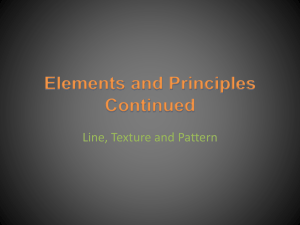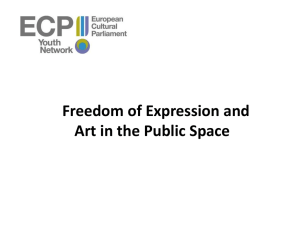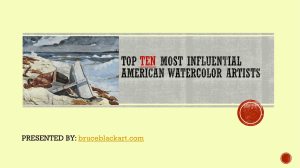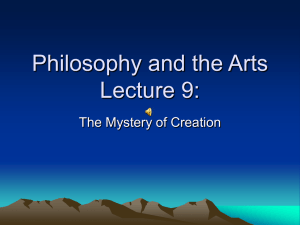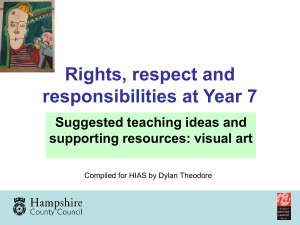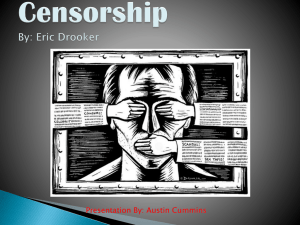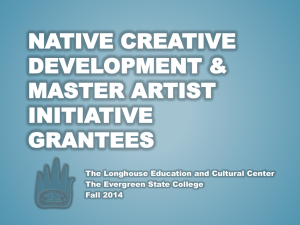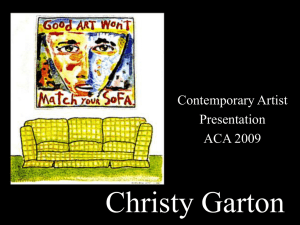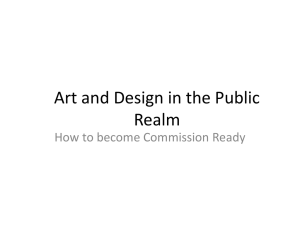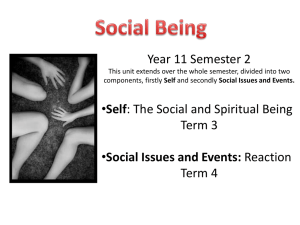week4-artist-as-theorist
advertisement
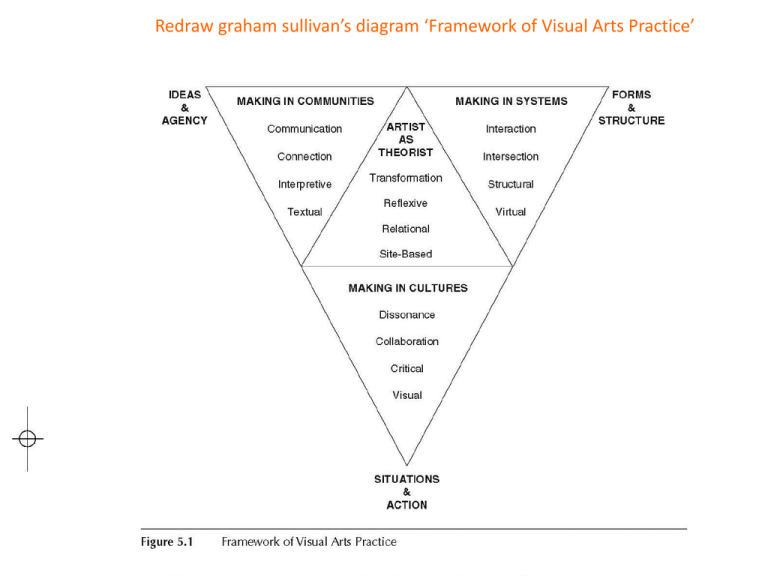
Redraw graham sullivan’s diagram ‘Framework of Visual Arts Practice’ chen zhen • born in shanghai in 1955 and deceased in 2000 in paris • considered the leading representative of the chinese avant-garde. • catalogue of works http://www.chenzhen.org/2000.htm http://www.dailymotion.com/video/x2g8am_chen-zhen-exhibition_creation examples of artists as theorists • chen zhen, shanghai 1955-paris2000 • Yong Soon Min South Korea, ‘la chose plus importante’ (the most important thing in art is to first show the artist’s piece of identification) chen zhen said ‘the most important thing is that the cultural hybrid is no longer limited only between two cultures, but among the many cultures and civilisations’. ‘chen zhen: the body as landscape’ exhibition at the mart, rovereto, italy 23rd february 2008 - 1st june 2008 http://www.designboom.com/contemporary/chenzhen.html notion of ‘transexperience' • “summarizes vividly and profoundly the complex life experiences of leaving one’s native place and going from one place to another in one’s life.” “This condition, characterized by in-between ness, has similarities to many other descrip tions of the diaspora, but the departure from convention lies in the way that Chen considered transexperience as a creative catalyst.” • Melissa Chiu • http://artzinechina.com/display_vol_aid464_en.html Yong Soon Min, Defining Moments. 1992. Six-part photographic installation. Body image (left)1/6, Gwangju image (right) 4/6. 20 x 16 inches. Many contemporary artists move easily over the terrain of other disciplines as they absorb, adapt, and co-opt a research language. For instance, a potent sense of historical and cultural critique is achieved by Yong Soon Min in her 1992 photographic installation, Defining Moments. Yong Soon Min describes the work this way: “All of the images and dates of Defining Moments refer to dates with personal significance that have uncanny connections to important events in Korean and Korean American history. The year 1953 was the year of my birth as well as the year that the Korean War ended. The next date is known in Korean as ‘Sa-il-gu’ or 4/19, the date of the popular uprising in South Korea that overthrew the Syngman Rhee government which I witnessed as a child. This event allowed our family to leave Korea. 5/19/80 refers to the Gwangju uprising and massacre, an important turning point in Korean history that served as a catalyst in my growing interest in current Korean history. The last date, ‘sa-i-gu’ or 4/29 refers to the LA riots which also happens to be my birthday.” (cited in Hwa Young Choi Caruso, 2004, p. 201). Extract from Art Practice as Research, Chapter 6, Artist as Theorist, p. 15 Stephen Wilson the author’s companion web site http://userwww.sfsu.edu/~infoarts/links/wilson.thames.html http://www.thamesandhudson.com/artscienceartists.html LEONARDO THINKS 1968 - 2011 Historical Article by Stephen Wilson http://www.leoalmanac.org/index.php/lea/entry/industrial_research_artist_a_proposal/ Industrial Research Artist: A Proposal • I. Introduction: The Absence of Artists at the Frontier of CultureII. • II. Analysis of the Problem: The Isolation of Artists From Industrial Research and Development (R&D) • III. The Difficulty of Involving Artists in Industrial R&D • IV. A Possible Solution: Industrial Research Artists • V. Benefits of Artist Involvement in Industrial R&D • VI. Summary: The Challenge Artist Placement Group (APG) • founded in 1966 • artist-run organisation • Aim: place art outside the gallery, predominantly through attaching an artist in a business or governmental context for a period of time. http://en.wikipedia.org/wiki/Artist_Placement_Group Artist Placement Group (APG) • Founders: Barbara Steveni, John Latham (background: Flat Time Ho, belham rd, peckham) http://www.ligatus.org.uk/fth/ Context is half the work central APG axiom suggests • 1-Creative engagement between the artist and the host: APG is not concerned to seek 'employment' for artists, but in placing 'creative' people inside the working parts of governments, organisations and institutions http://interrupt.org.uk/symposia/educator/repositioning-art/ 1969, 1st Industrial placement: British Steel, Port Talbot, one of the largest steel-producing complexes in the country Artist: Garth Evans Project: interviews apprentices on-site, culminating in a paper for the Iron and Steel Federation as well as reports for the corporation. David Hall on his B.E.A. placement filming cloud formations over the Swiss Alps. 1970, Industrial placement: British Airways Artist: David Hall Project: He went with a British Airways crew, filming the special cloud formation which forms over the Rock of Gibraltar. He made particular proposals to BA to incorporate more of the visual flying experience into their airport environs. Film still from The Journey, made by Ian Breakwell on an APG placement with British Rail. 1970, Industrial placement: British Railway Artist: Ian Breakwell Project: The Journey, a film made with British Rail, was interesting as art and well received by British Rail as was his presence with them. There was a slight upset since the soundtrack was of the girl in the train seat opposite apparently having an orgasm. "Peterlee only started in the 1950s so the history of the area is the history of the villages that grew up around the pitheads," he said. http://www.easington.gov.uk/services/arts/4-6184.asp 1976, government placement: Peterlee Development Corporation as Town Artist. Peterlee was a new town (1950s) Artist: Stuart Brisley Project: ‘History Within Living Memory'. contained three distinct parts: 1- to develop an ongoing process of collecting and disseminating information under the title History Within Living Memory 2- to establish a publicly available history of the Development Corporation made in association with the Sociology Dept of the University of Durham 3- to introduce a community workshop dealing with current issues Horden, Easington District Council 1900. • six local people were employed to make tape recordings, transcribe them and collect photographs to provide a statement of life in the villages from prior to World War 1 to the present. • Photographs lent to the project were enlarged and mounted, and an archive organised.
